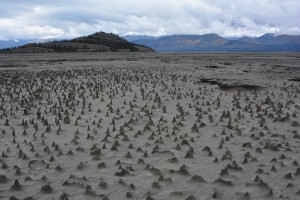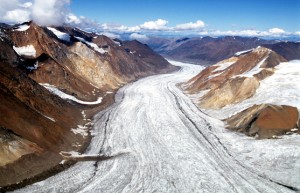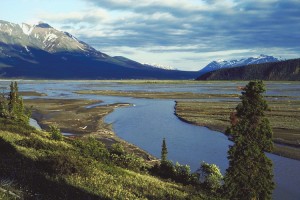A Canadian River’s Sudden End
Tuesday, May 2nd, 2017May 2, 2017
In Canada’s Yukon territory, increased melting of the vast Kaskawulsh Glacier has caused the nearby Slims River to run dry. The Slims, once a gushing channel of glacial melt water, is now a waterless expanse of mud and dust. In recent decades, increased temperatures caused by global warming shrank the Kaskawulsh Glacier to the point that its melt water found an alternate route out of the Saint Elias Mountains, cutting off water to the Slims.

Parts of Kluane Lake, which received much of its water from the disappeared Slims River, have dried up, leaving behind these small pinnacles of hardened sediment. Credit: Jim Best, University of Illinois/University of Washington (licensed under CC BY 2.0)
For centuries, Kaskawulsh melt water fed the Slims River (as well as the Kaskawulsh River), which in turn fed Kluane Lake as well as the Kluane River. In 2016, however, a scientific expedition into the remote area found that the Slims had changed dramatically. In place of the river’s wide, rushing waters, the expedition found a narrow stream running down a path of mucky and treacherous sediment. The scientists learned that melt water from the shrinking Kaskawulsh Glacier had shifted outlets and was now feeding only the Kaskawulsh River—which had grown in size. In geology, the diversion of water from one river to another is called river piracy. River piracy occurred in ancient times—such as during and after the last ice age—but the theft of Kaskawulsh waters is the first modern case known to science.

Kluane National Park and Reserve is in southwestern Yukon, a territory of Canada. Global warming has reduced the park’s Kaskawulsh Glacier, shown here, and shifted the flow of its melt water. Credit: © Parks Canada
Between 1956 and 2007, the Kaskawulsh Glacier retreated some 2,300 feet (700 meters). In recent years, however, the retreat greatly accelerated, ultimately resulting in a sudden and radical water diversion in 2016. New melt water channels were carved in a matter of days, and the glacial waters found their way only to the Kaskawulsh River—leaving the Slims River high and dry.

Yukon is a northern Canadian territory known for its magnificent scenery. Kluane National Park, shown here, features the Wrangell and Saint Elias mountain ranges. Credit: © Thinkstock
The sudden shift in geological landscape altered much more than the view: fish and other wildlife populations either moved, migrated, or died, and entire plant populations withered and died. A statistical analysis, published in the journal Nature Geoscience in April 2017, blamed the Kaskawulsh river piracy squarely on anthropogenic (human caused) climate change. The analysis warned that river piracy could become a common event as glaciers retreat around the world. Few people live in the Kaskawulsh area, but sudden river piracy in heavily populated regions dependent on glacial melt for water—such as the Himalaya in Asia or the Andes in South America—could have catastrophic effects on human populations.


